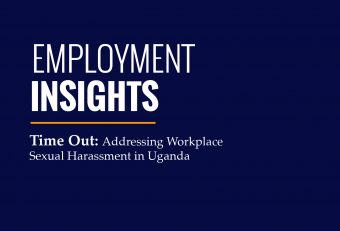The COVID-19 Pandemic has had several impacts on Uganda’s oil and gas (petroleum) industry. Below, we address the impact of COVID-19 on the petroleum upstream, midstream and downstream sectors in Uganda.
Upstream
The upstream sector refers to the exploration, development, production and decommissioning of petroleum fields.
Currently, Uganda has approximately 6 billion barrels of oil equivalent with 1.4 billion barrels recoverable and over 500 billion cubic feet of gas. The country hopes to join the league of oil producers in the next couple of years. Over the last few years the industry has suffered several setbacks that have delayed first oil.
The COVID-19 pandemic which has literally closed the world economy could not have come at a worse time for the petroleum industry globally including the upstream sector in Uganda.
COVID-19 and the Oil Price War
The COVID-19 pandemic emerged at a time when two of the world’s largest oil producers, Saudi Arabia and Russia set off an “Oil Price War” by increasing production of oil and battling for market share. Before the COVID-19 pandemic, crude oil was trading at more than US$50 a barrel. Russia refused to sign on to Saudi Arabia’s proposed cuts, sending the price of oil sharply down. Saudi Arabia responded by slashing the price of its oil and later announced plans to massively increase oil output, further driving down the price of oil. This Oil Price War has left the global market with far more crude oil than is needed. Additionally, it is common knowledge that the price of a commodity such as crude oil is determined by factors such as supply, demand as well as quality. Given the current COVID-19 pandemic the demand for oil has significantly dropped owing to the global travel ban. As such, owing to oversupply of crude oil, it was reported that there were no storage facilities in the United States available which in turn completely depressed the price of crude oil and subsequently the commodity was of no value. For instance, as of April 20th, 2020, the United States crude oil futures tumbled to below US$0 with West Texas Intermediate (“WTI”), the US benchmark settling at US$ -$37.63 (United States Dollars negative thirty seven and sixty three cents) per barrel. This is the lowest level since the NYMEX (New York Mercantile Exchange) started trading in oil futures in 1983.
Oil futures contracts are entered months in advance. However due to the COVID-19 pandemic, and the low demand for oil globally, the world has more oil than it can use. As a result, oil buyers and suppliers are not willing to purchase more oil, despite previous contractual obligations as they have nowhere to store the excess oil.
As of April 21st, 2020, WTI was trading at below $0 a barrel, while Brent Crude was trading at $20.17. It is important to note that Brent Crude is the main oil benchmark for the rest of the world, while WTI is the benchmark for the United States of America. The current price of Brent Crude reflects an 18 -year low in the price of oil, however it is not expected to go below $0 a barrel.
What does this mean for the upstream industry in Uganda and the Final Investment Decision (“FID”)?
A depressed price can make the petroleum project in Uganda uneconomic and can also have a significant impact on the ability of investors to make the necessary investment decisions. This has already happened in several jurisdictions. However, the petroleum industry is cyclic by nature and experiences a number of uncertainties during the lifetime of any project. The petroleum sector is characterised by heavy investments, long lead times and price volatility, hence today’s oil price may not necessarily hinder investments in oil projects like Uganda’s. There is clear optimism that the price of crude oil will bounce back to profitable levels for upstream projects once the world economy is reopened and starts to recover from the effects of the COVID-19 pandemic.
The Tullow Transaction
On 23rd April 2020, Tullow Oil announced that it had sold all its interests in the Lake Albert project to Total E & P for US$ 575 Million. The key transaction highlights are; a cash payment of US$500 Million upon successful completion of the transaction; US$ 75 Million at the FID (Final Investment Decision); Contingent payments linked to the oil price when production commences. Completion of the transaction is subject to approval of Tullow shareholders, an agreement with Uganda Revenue Authority on the tax treatment of the transaction and all other necessary government approvals. CNOOC has a pre-emption right. A pre-emption right is in effect an anti-dilution mechanism. A pre-emption right allows a joint venture partner to insist on being offered the same terms as a proposed purchaser. In this case both Total and CNOOC are joint venture partners in the Lake Albert Basin and hence CNOOC can pre-empt and take up to 50% of the asset.
The significance of this transaction cannot be overstated. It comes at a time of historically low oil prices and a world that is in peril. The fact that this deal could be done in this environment is a huge vote of confidence in the Lake Albert project, Uganda’s investment climate and takes us much nearer to FID. FID has become a buzzword in the Uganda’s petroleum industry, but it loosely refers to the decision made by the various partners to invest in Uganda’s petroleum resource and commercialise it. FID is an event that will sound the gun on the development, refining and transportation of the petroleum within the Albertine region. The realisation of FID would allow for the development of the petroleum Upstream and Midstream sectors to truly commence. The main issue that hitherto hindered the Joint Venture Partners from moving on FID was the Government of Uganda’s tax treatment of the previous Tullow Oil transaction resulting in Tullow’s inability to complete its planned farm-down of part of its one-third stake to its partners; Total E&P and CNOOC. This tax issue has fortunately been resolved.
Any tax agreement would have to be executed with the URA and must comply with the tax laws of Uganda. Further it is advisable that the parties seek a private ruling from URA in accordance with Section 45 of the Tax Procedure Code Act, prior to completing the transaction.
The Impact of the COVID-19 Regulations
Notwithstanding the Tullow transaction, the challenge from the COVID-19 pandemic cannot be overstated. The ability to move equipment to Uganda or even personnel will obviously be hindered by the global economic lockdown. Uganda for example, is enforcing its Public Health Act to implement a countrywide lockdown, which lockdown may be partially phased out after May 5th, 2020 in accordance with the Public Health (Control of COVID-19) (No.2) Rules, 2020 as amended.
Petroleum Upstream companies have been faced with the difficulties of maintaining business activity while restructuring methods of operation, in adherence to provisions of the Occupational Safety and Health Act, 2006. Companies have been forced to suspend guided on-site tours and stakeholder engagements in efforts to minimise unnecessary social contact, as the preservation of life takes precedence and in accordance with the COVID-19 regulations. The suspension of these stakeholder engagements, being an integral part of the development of the petroleum sector in Uganda.
As a result of the travel ban imposed by the Public Health (Prohibition of Entry into Uganda) Order, 2020 as amended, companies are also facing a disruption to their labour force. The COVID-19 pandemic coincided with the Chinese new year celebrations, during which time a number of (Chinese) expatriate workers had travelled out of Uganda. Travel restrictions imposed by overseas states coupled with the Ugandan travel ban caught the expatriate workers on the outside of these restrictions, forcing them into a situation where they have since been unable to return to work.
Whereas COVID-19 poses a significant setback to the petroleum Upstream sector in Uganda, its effects are likely to be short-lived. The Joint Venture Partners and the Government of Uganda should focus on reaching FID and setting the course for First Oil in Uganda.
Midstream
The Pipeline and the Refinery
In Uganda, the midstream sector encompasses the refining, conversion, transmission and storage of petroleum products. Uganda’s oil resources are located almost 1400 Kilometres (KM) from the nearest coastline in Mombasa and 1445 KM from Tanga in Tanzania. The ability to move the crude oil from the ground to the market is an essential part of developing Uganda’s crude oil resource. The realisation of First Oil in Uganda is therefore an integrated project that includes both the midstream and upstream sectors. For the midstream operations the country is looking at the development of a refinery and the construction of the world’s longest heated crude oil pipeline from Hoima to Tanga in Tanzania. The COVID-19 restrictions on movement as well as the travel ban introduced to reduce the spread of COVID-19 will influence the ability to deliver these projects across the two jurisdictions.
The Uganda Refinery Project cannot be commenced or concluded without significant progress being made in the Upstream project. Hence the challenges of the Upstream project detailed above will influence subsequent projects in the Midstream sector.
Downstream
The downstream sector is categorized by petroleum operations such as the distribution, marketing and selling of petroleum products. This sector has been directly affected by the COVID-19 regulations in Uganda as summarised below.
The Exempted Services
Rule 7 of the Public Health (Control of COVID-19) (No.2) Rules, 2020 as amended, prohibits the use of any motor vehicle or engineering plant on any road in Uganda. However, Rule 8 provides for exemptions to Rule 7. Rule 8 (1) (f) in particular, provides that Rule 7 shall not apply to motor vehicles or engineering plants that are used to provide fuel service stations.
Rule 8 (4) further provides that Rule 7 shall not apply to a motor vehicle or trailer that carries cargo within Uganda or which is in transit in Uganda.
Similarly, Order 3 (b) of the Public Health (Prohibition of Entry into Uganda) Order, 2020 as amended, provides that this Order shall not apply to any vehicle or aircraft used for the conveyance of cargo into Uganda through any border post. Therefore, importers of petroleum products are exempt from the prohibitions.
The COVID-19 Risk
Petroleum products can still be imported into the country and petrol stations can remain in operation subject to the countrywide curfew. This exemption especially for importers creates a separate risk, the risk of contracting COVID-19 by the workers employed to carry out downstream operations. These include truck drivers and turn boys who transport petroleum products from Kenya and Tanzania into Uganda or through Uganda to Rwanda, South Sudan, Eastern Congo and Burundi. Owing to this risk, the Government of Uganda resolved to test all truck drivers at border points of entry into Uganda.
This therefore brings into play the duty of an employer to the employees that are at risk of contracting COVID-19 during their employment. Section 3 of the Workers Compensation Act, Cap 225 provides that an employer is liable to pay compensation to a worker that is injured in the course of a worker’s employment. The Act goes on to provide for computation of this compensation depending on whether the injury results in fatal injuries, permanent total incapacity, permanent partial incapacity or temporary incapacity of the worker.
Furthermore, Section 18 of the Workers Compensation Act requires every employer to take out an insurance cover for any liability that he or she may incur under the Act in respect of his or her workers. This insurance cover is meant to cater to medical costs, payment of missed wages, necessary care for the injured employee, funeral costs among others.
In light of COVID-19 therefore, downstream employers and particularly cargo transporters shall legally be mandated to pay compensation to their employees, in the event that an employee contracts COVID-19 during the course of his or her employment.
Other Obligations of the Employer
In addition to the above, the Occupational Safety and Health Act, 2006 (“OSHA”) places a statutory obligation on employers to take all necessary measures to ensure the protection of their workers as is reasonably practicable. Reasonably practicable care to maintain safe and healthy work environments indicates, during a global pandemic, that the standard of a safe and healthy workplace shall develop continually as information on the COVID-19 situation in Uganda is circulated.
OSHA under section 20, requires employers with at least 20 employees to maintain a written health and safety policy statement. Employers are further required to adequately inform employees about the dangers posed to their health, in this instance by the ongoing COVID-19 pandemic. This can be done by referencing the Ministry of Health guidelines as released, detailing the do’s and don’ts on COVID-19 and the specific measures of prevention put in place by the Government of Uganda.
Employers must conduct training, provide appropriate instructions and regularly circulate safety information to employees.
It is further recommended by the Ministry of Health, that exempted organisations develop and adopt preventative measures that avoid situations of social contact without completely paralyzing business activity. In addition, businesses are urged to implement standard operating procedures(“SOPs”) that allow for business continuity in alternative ways.
Employers can implement SOPs that include the restriction of entry into the workplace, monitoring the temperatures of employees, sanitising tools of the trade and shared working spaces. It will be a violation of the employer’s statutory obligations under the OSHA to permit a person suspected of having COVID-19 to work. Furthermore, failure to observe the obligation could lead to a claim for workers compensation.
The Employment Factor
COVID-19 has also had an impact on the employment of those employed to carry out downstream operations. Although the operations are exempt from the prohibitions that have been set in place, there has been a huge decrease in the demand of petroleum products such as fuel. This is largely attributed to the fact that the country is under a mandatory lockdown and most of the population is at home. This may in turn lead to the laying off or termination of some of the employees as a cost cutting measure by downstream operators.
On March 25th, 2020, The Ministry of Gender, Labour and Social Development issued guidelines on the employment effects of COVID-19 on employment relations. The guidelines propose that any cost cutting measures regarding employees should be carried out in accordance with the law, collective bargaining agreements and employment contracts. The guidelines advise against termination of employees and propose that employees should be encouraged to take pending annual leave and or leave without pay, upon agreement with their employers. The guidelines further propose that in the event of lay offs, there should be commitment by the employers that workers shall be re-engaged once work normalizes
Impact of COVID-19 on the pump prices
Currently, there is low global demand for petroleum products as a result of the lockdown measures used to curb the spread of COVID-19. It remains unclear what impact, if any COVID-19 and the resultant collapse of the oil price will have on the pump price.
In Uganda, Section 30(3) of the Petroleum Supply Act, 2003 provides that the prices of petroleum products throughout the supply chain shall be governed solely by the rules of supply and demand in a free and competitive market. This means that the price is a function of market forces and would include things like the cost of oil, the cost of transportation, currency changes, marketing and distribution costs and taxes to mention a few. It is prohibited to set the price in a manner that undermines free competition or that supports the rise of a cartel that attempts to control prices. The import of Section 30 therefore means that the global drop in price may not necessarily be reflected by a drop in the pump price, provided that downstream market players are able to show that the pump price is a reflection of the market reality in Uganda and not the result of any manipulation.
The impact, therefore, is yet to be seen or felt as pump prices in Uganda remain stable even after the collapse of the global oil price. The global drop in demand for oil is however expected to gradually normalize once the worldwide restrictions are lifted as there may be an increase in demand for petroleum products.
Conclusion
COVID-19 has changed the way the world is doing business. It has slowed the global economy which is powered by the petroleum sector. Players in the entire petroleum value chain are feeling the effect of this slow down on their businesses. It is important that players in the petroleum sector in Uganda comply with the guidelines and regulations to ensure that they and their employees stay safe in this most unpredictable time.





